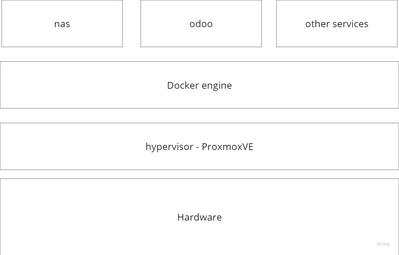Hello, to everyone.
Seeking your comments, recommendations, ideas, advices.
I'm not an IT guy, just a regular PC user who decided to check if he can save some money on buying Synology by building all the wanted services by himself. Everything open-source or free of charge - a pleasant benefit.
Plan minimum: to have a home server for NAS, about two VMs of Windows and Linux to play around, streaming service, host Odoo to learn it, VPN server, few more applications to move from Google Photos, docs, etc.
Plan maximum: All above and space to run some AI helpers for a family self-hosted, creating nodes at all family places as backup and\or for faster UE for those who are closer to the specific node.
For now, I just want to check that I can do at least some of this. Starting small with the following hardware: Machinist PR9 X99 motherboard, Intel Xeon E5 2650 V4 CPU (set from Aliexpress), 16GB non-ECC RAM, 256GB SSD, 2TB HDD, some graphic card and PSU (had some spare parts).
I don't want to spend more money on hardware before I'll be able to make some proof of concept build. And I don't really want to learn a new profession by building this project)
As will be moving down this road will share here the progress.
If I succeed will look into SBCs (with NPU maybe) or low-power consumption builds.
Right now I've almost completed the assembly of the hardware.
Looking forward to diving into the software part.
Check me, please, if I understood correctly all the relations
Could this scheme be easier? How to optimize the plan?
Where in this scheme goes portainer and do I need it at all?
All the comments and recommendations are welcome. Good links could be helpful too.
@ignatiykalakutskiy welcome to the VHT forums! And, i think you have come to the right place as I know there are a lot of talented self-hosters who frequent the forums and will have valuable input. I think everything you have mentioned makes sense to me. Starting slow and without much money invested is a great way to get your feet wet and even see if it is something you want to spend more money on in the future.
The good news is, there are a lot of great resources online today (Amazon, AliExpress, and many other online vendors to get things fairly cheap. Today's hardware goes a long way also, especially if you are running mainly containerized self-hosted services.
It looks like that is the approach you are pursuing here. I do think you have the logical layout understood here - hardware > Proxmox > Docker > containers. I would start with Proxmox and install a good Linux distro like Ubuntu to create a Docker host where you can run your containers.
Can you run Docker directly on top of Proxmox? Yes, however, a VM will give you an easy rollback mechanism (ability to create backups, take snapshots, and many other features that you won't get without the VM abstraction layer.
Also, once you have your Docker host or hosts running in VMs, Portainer is its own Docker container that will be able to manage the other Docker containers on your Docker host. If you install Portainer in one of the hosts as a container, you can install the Portainer agent on the other Docker host to have it managed by the single Portainer instance.
Let me know if that makes sense. Again, great to have you here in the forums!


